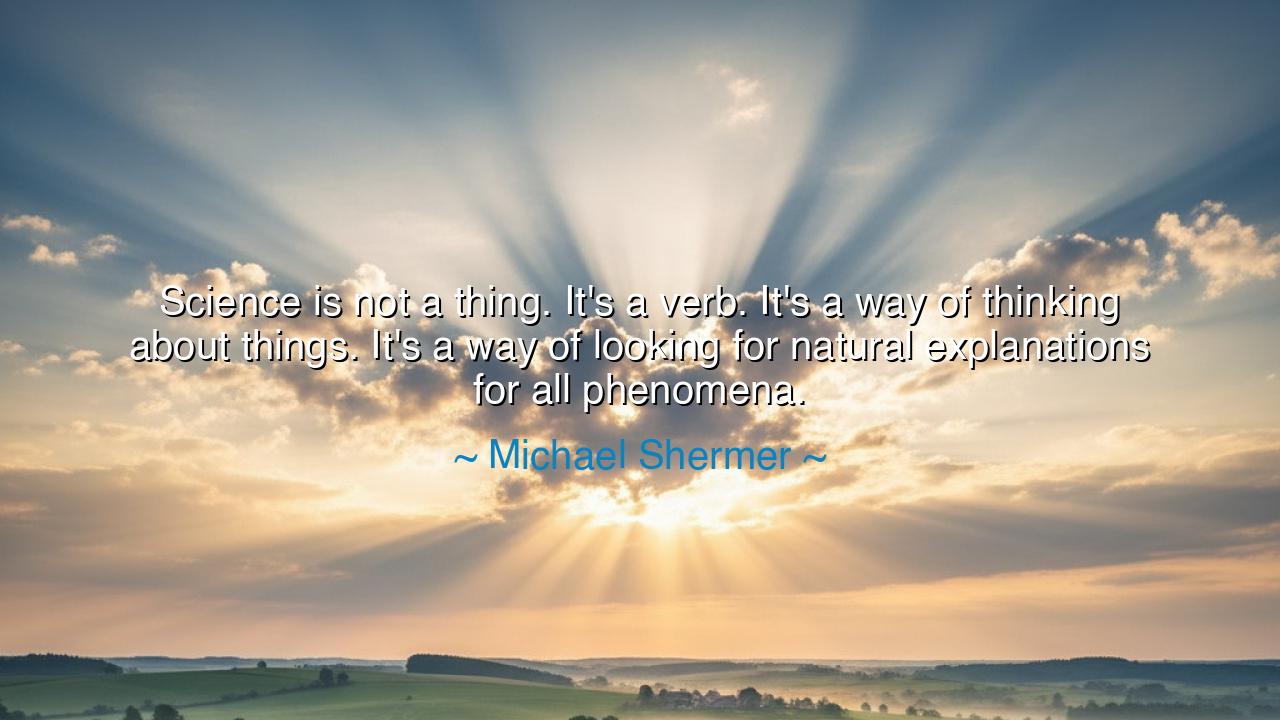
Science is not a thing. It's a verb. It's a way of thinking about
Science is not a thing. It's a verb. It's a way of thinking about things. It's a way of looking for natural explanations for all phenomena.






Hear me, O Seekers of Truth, for the words of Michael Shermer call us to recognize the true nature of science: "Science is not a thing. It's a verb. It's a way of thinking about things. It's a way of looking for natural explanations for all phenomena." These words resonate deeply, reminding us that science is not merely a static body of knowledge to be possessed and stored, but a dynamic process, an active pursuit that shapes the way we understand the world around us. Science, as Shermer teaches, is a continuous journey—a method of questioning, observing, and discovering the natural explanations for the mysteries of life.
In ancient times, the great philosophers understood that knowledge was not something to be hoarded but something to be actively pursued. Socrates, the wise sage, did not claim to possess knowledge; instead, he sought it through the act of questioning and dialogue. For him, the search for truth was an ongoing process, never to be fully completed. The ancient Greeks believed that knowledge was like an ever-expanding horizon, a path toward enlightenment that could only be traveled by those willing to question, observe, and think critically. This way of seeking knowledge is the essence of what Shermer speaks of—science as a verb, a method of engagement with the world.
Consider, O Children, the example of Archimedes, who lived in a time when science was not the systematic discipline we know today but was intertwined with philosophy and mathematics. Archimedes is said to have had his famous insight into the principle of buoyancy while stepping into a bath, leading him to shout, "Eureka!" He was not simply experiencing an epiphany; he was actively engaged in the process of scientific inquiry—observing, thinking, and reasoning out a natural explanation for the behavior of water. This moment was not the end of science but the result of a mind continually seeking deeper understanding. Like Shermer's verb, science is about the active process of seeking answers, of being in a constant state of inquiry.
Shermer's call to view science as a verb also echoes the wisdom of Isaac Newton, whose work in mathematics and physics fundamentally changed our understanding of the world. Newton’s laws of motion and the theory of gravitation were not merely discovered; they were the result of a long process of observation, experimentation, and theoretical reasoning. His understanding of gravity came from questioning the forces at play in the universe, not from static knowledge but from an active engagement with the world. Just as Archimedes was a seeker, so too was Newton—always questioning, always investigating. For both men, science was not a fixed thing to be understood once and for all but a continual process of uncovering, analyzing, and interpreting the forces of nature.
The lesson here, O Seekers, is that science is not a destination but a journey. It is not a collection of facts to be memorized, nor is it a rigid structure of knowledge that limits our understanding. Rather, science is a way of thinking, an approach to the world that seeks to find the natural explanations for all phenomena, whether they are the mysteries of the stars, the behavior of atoms, or the actions of humans. Just as Socrates engaged with others through the art of questioning, so must we engage with the world through observation, analysis, and reasoning. Science is about remaining curious, about constantly seeking new explanations and insights, and never allowing the mind to rest in ignorance or complacency.
In your own lives, O Children, let science be your guide, but remember that it is not simply a field of study; it is a way of being. Engage with the world around you not just as passive observers but as active seekers of understanding. Ask questions, challenge assumptions, and seek the natural explanations behind the events and phenomena you encounter. The path of science is not always easy; it requires patience, dedication, and the courage to embrace uncertainty. But in this path lies the true power of humanity—the ability to understand, to reason, and to uncover the mysteries that shape our world.
So, O Seekers, walk the path of scientific inquiry with the spirit of curiosity and humility. Remember that science is not a finished product but an ongoing process, a verb that requires your active participation. As you journey through life, let your mind remain open, always ready to learn and discover. For it is in the active search for truth that we find the deepest meaning of existence. Keep questioning, keep seeking, and know that the pursuit of knowledge is a never-ending adventure—a quest for understanding that is the very essence of what it means to be human.






AAdministratorAdministrator
Welcome, honored guests. Please leave a comment, we will respond soon